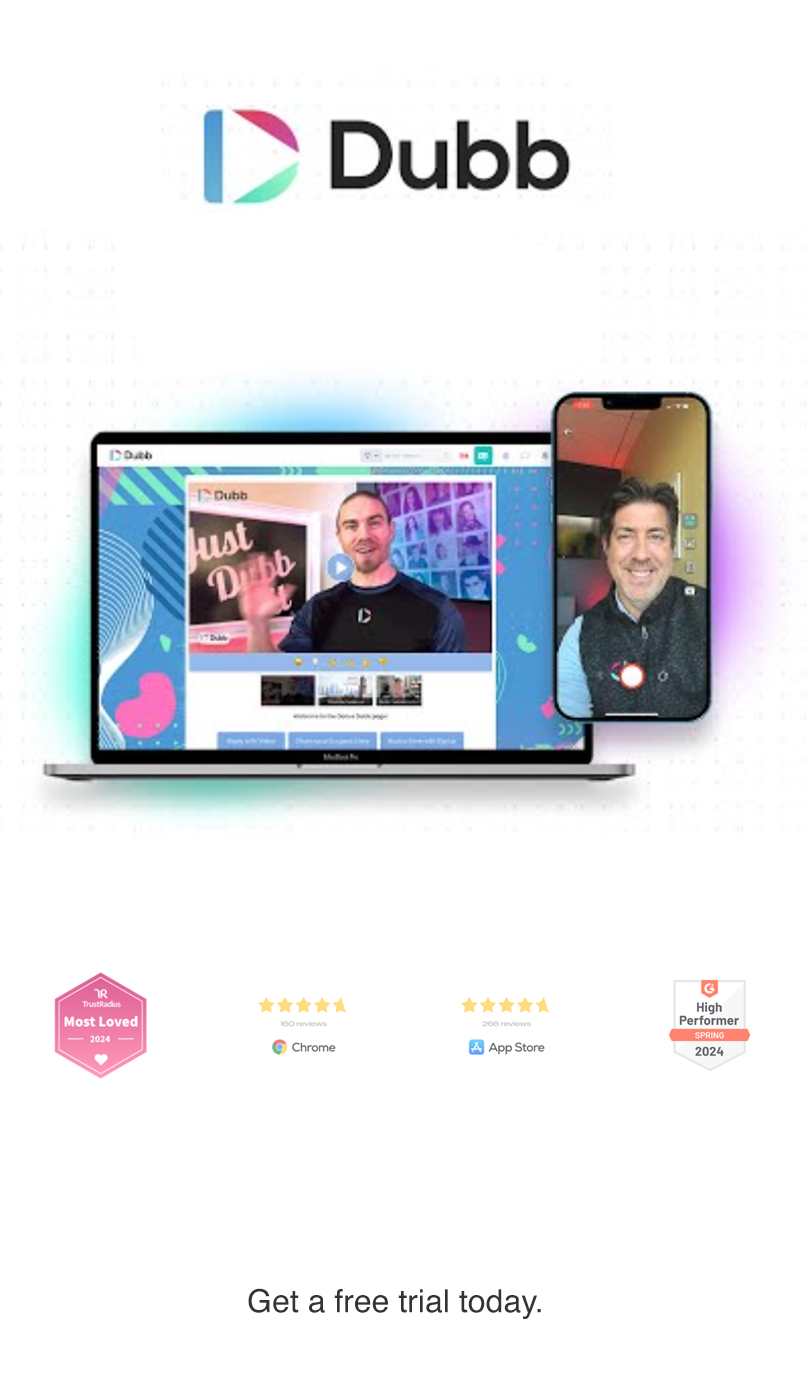You probably aren’t the only person who is wondering how real estate agents can use AI. We are in the midst of an AI revolution, with tools like Open AI’s ChatGPT generating a ton of conversation right now.

Source: Pexels
The term artificial intelligence can be daunting. After all, it conjures up the idea of thinking computers that may (or may not) have our best intentions at heart.
While we don’t know how the development of true artificial intelligence will play out, what we do know is that there are plenty of ways that you can use AI right now to grow and scale your business.
Even better? You don’t need to be an expert in artificial intelligence (or technology in general) to use these tools. You can use them today to find new clients, build stronger relationships with your current leads, and generate more sales.
So are you ready? Let’s take a look at AI and how it can help real estate professionals like you accomplish your goals.
Table of Contents
The Current State of AI: Broad Use Cases
How Real Estate Agents Can Use AI: Some Applications
Using AI for Your Social Media Posts
Actually Generating the Text Content
Creating Content From Your Videos
Creating Videos From Your Content
Predictive Analytics and Property Valuation
The Current State of AI: Broad Use Cases
In some capacity, we are seeing AI everywhere we look right now. The most notable mention is ChatGPT. If you take a look at social media (particularly, Twitter), you have surely seen screengrabs from Twitter users interacting with the AI chatbot.

Source: Pexels
ChatGPT isn’t the only game in town, however. We have seen AI image creators like Dall-E and Stable Diffusion transform pieces of text into stunning images. Tools like Jasper AI can help you create cool avatars.
These are just some of the increasing number of tools out there that let anyone leverage the power of AI. Even more interesting is that we are still in the very early innings of this technology. GPT-4, for instance, promises a significant step forward in natural language processing. Essentially, it will become an even more powerful tool that will help us do even more things faster, cheaper, and more efficiently.

Source: OpenAI
Right now, however, AI is mostly being used for research, content generation, actual creation, and analytics. Let’s dive into each of these topics a bit more.
- Research: In terms of research, AI can help us brainstorm ideas, get statistics, and expand our general knowledge base. What you can do is open up a tool like ChatGPT, ask it to help you brainstorm ideas around a specific topic, and let the technology go to work. As you’ll see below, you will want to follow several best practices to make your queries as effective as possible.
- Writing: AI can also help us with writing. At its core, it can help us cure writer’s block. We can use it to create content in so many different areas. For instance, we can use it to create scripts for social media posts, content for our email lists, subject lines on some of our emails, and even video messages that we send to prospects and clients. You can even use AI to help you craft a speech. While you certainly won’t want to rely on the first draft that an AI gives you, it can be a great jumping-off point as you create our content.
- Other Content Creation: Third, you can use AI for actual creation. For instance, at Dubb, we have an AI assistant named Ira (Interactive Reaction Assistant) that can help you take text and turn it into video. But beyond that, you can use AI to create talking avatars, create filters on social media, and more.
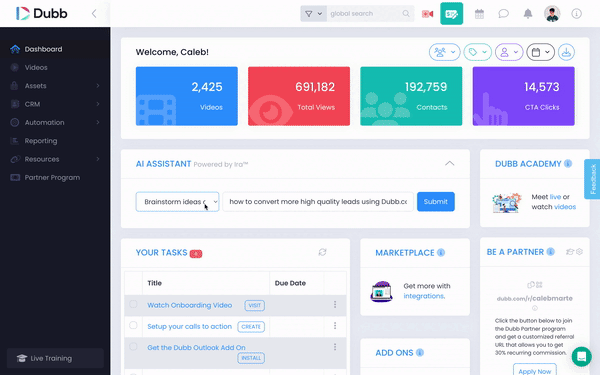
- Analytics: Finally, there is using AI in your analytics. Using AI, you can obtain better lead scoring and better speech analysis to determine how you are communicating with your prospects and customers. You can also more easily track your customer journey, which can help you better engage with your leads and increase your chances of converting an interested lead into a paying client.
Ultimately, as AI evolves, it is going to have a bigger impact on both our personal and professional lives. Right now, we are lucky to be at the forefront of this technology and be in a position where it can already help us grow our real estate businesses.
Submitting Good Queries
Before we move on to discuss specific strategies for real estate agents, I want to make one important point about using AI tools right now. It may make the difference between you getting immense value from AI tools and seeing these AI tools as close to a waste of time.
Like using Google or any other type of search engine, you need to be intentional with your search queries. The AI can only deliver value if you are asking it the right questions.
Because the technology is so new, we are all trying to figure this out together. That said, there are some good ideas that tend to overlap with many best practices when you are submitting search queries on tools like Google. These ideas include:
- Embrace specificity: The more specific your question or query is, the better AI tools like ChatGPT will be able to understand what you’re looking for and provide accurate and relevant search results. Try to be as clear and concise as possible when asking your question. In other words, if you’re debating between a very specific and slightly less specific query, opt for the former.
- Use natural language: This is a big one. Tools like ChatGPT are designed to understand natural language, so try to ask your question or query in a way that feels natural to you. You don’t need to use specific keywords or operators like you would when using a traditional search engine. Just speak like you would to any other person (or sentient machine).
- Provide context: If your question or query requires some additional context, provide it when asking your question. This can help your AI tool better understand what you’re looking for and provide more relevant search results. Sometimes, you may need to provide more context than you initially anticipated.
- Use follow-up questions: If the initial search results provided by your AI assistant are not exactly what you were looking for, you can ask follow-up questions to help narrow down the search results. Tools like ChatGPT are designed to be conversational, so feel free to ask additional questions or provide more information as needed.
- Be patient: These tools are a work in progress. For instance, ChatGPT is a powerful language model, but it may not always provide the perfect answer on the first try. If the initial search results are not what you were looking for, keep asking follow-up questions or refining your query until you get the results you need.
Keep all of this in mind as you are using your favorite AI tool. They will get you much closer to the results that you are looking for. Remember: if you aren’t satisfied with the first answer the AI gives you, keep digging deeper. Keep asking questions. Eventually, you’ll probably find something that is useful or that directly answers the question you are asking.
How Real Estate Agents Can Use AI: Some Applications
Considering the above, let’s now segue and speak about how real estate agents like you can use AI in your day-to-day work.
As a reminder, these are just a few ways that you can leverage AI. In the next few weeks or months, there may be an even better AI program that can massively expand the number of use cases. Because of this, you’ll want to pay attention to news surrounding some of the latest tools and advancements. You don’t need to look at the news every day, but don’t hesitate to keep yourself posted from time to time.
With that said, let’s jump into it.
Creating a Content Calendar
Let’s talk about content calendars. Content calendars are really important for any content creator, but they are especially important for real estate agents like you. They can help you stay organized and ensure that you are always engaging with your fans and followers on social media. This consistency helps to build trust with your audience and keeps them engaged with your brand.
Collaboration is another large piece of this. A content calendar is a shared document that can be accessed by multiple team members, making it easier to collaborate on content creation and ensuring that everyone is on the same page. If you are working with a team on generating your content, you will want to create a content calendar to avoid mistakes and avoid wasted time.
Finally, there is measurement. By tracking your content on a calendar, you can better measure the success of your content marketing efforts. You can see which types of content are performing well and adjust your strategy accordingly.
So how can AI help you create a content calendar? There are several places where AI can help here:
- Scheduling: AI can help you to optimize your content calendar by suggesting the best times to post on social media based on historical engagement data. This can help to increase the reach and engagement of your content.
- Social media monitoring: AI can monitor social media platforms to identify trends and topics that are relevant to your brand or industry. This can help you to create content that is timely and relevant, and that will engage your audience.
- Multichannel planning: AI can help you to plan content across multiple channels, such as social media, email, and your website. By analyzing data from multiple sources, AI can suggest the most effective channels and formats for your content, and help you to create a cohesive content strategy that engages your audience across all channels.
The real benefit here is scheduling. You can use a project management tool like Asana as your home base as you plan out your content calendar. From there, you can use AI tools to monitor your posts (and your overall target market) to help you come up with ideas that will resonate with your audience.
Using AI for Your Social Media Posts
AI is in a good enough position to help you think of and craft social media posts. Whether you just started a social media page on Instagram or have a robust Twitter following, you can use AI to create some compelling social media posts that can grow your audience and lead to more clients.
Generating Content Ideas
Like I said above, AI can help us get over writer’s block. In your day-to-day life as a real estate agent, it can be difficult to consistently come up with content ideas. After all, you’re probably spending time with your clients or trying to cross off 100 items on your to-do list.
So how can AI help here?
It’s simple. You can ask your AI tool (like ChatGPT) to help you come up with some interesting content ideas for your social media channels. While you may need to double down and dig a little deeper into some of the ideas that the AI gives you, it can help spark some ideas and help you add your own spin to what the AI is suggesting.
For instance, let’s say that you are trying to think of some Facebook post ideas. What you can do is open up a tool like ChatGPT and say, “Give me some Facebook post ideas for a real estate agent in Chicago.” For reference, here is what ChatGPT gave back to us:
- Showcase your listings: Share high-quality photos and information about your latest listings in the Chicago area. You can highlight unique features of each property, such as a stunning view, a spacious backyard, or a state-of-the-art kitchen.
- Share local news and events: Keep your followers informed about what’s happening in the Chicago area, including local events, news, and developments in the real estate market. This will position you as an authority and source of information about the area.
- Offer home buying/selling tips: Share advice on the home buying or selling process, such as how to prepare a home for sale, how to negotiate an offer, or how to find the right real estate agent. This can be a valuable resource for your followers, and will show that you’re knowledgeable and helpful.
- Create virtual tours: With the pandemic ongoing, people are interested in virtual tours of homes. Create virtual tours of your listings and post them on Facebook to give your followers a detailed look at the properties you’re selling.
- Highlight your success stories: Share stories of happy clients you’ve worked with, and how you helped them find their dream homes in Chicago. This will demonstrate your expertise and success in the real estate industry.
- Share photos and information about Chicago neighborhoods: Share information about Chicago neighborhoods, including local restaurants, parks, schools, and other amenities. This will show that you’re knowledgeable about the area and help potential buyers find the perfect home in their preferred neighborhood.
- Post video content: Consider creating video content that provides information on the real estate market or tips for buyers and sellers. This can be an effective way to engage with your followers and provide valuable information.
- Host a Facebook Live event: Consider hosting a Facebook Live event where you answer questions about the real estate market, share information about your listings, or offer tips and advice for buyers and sellers.
- Share reviews from satisfied customers: Share reviews and testimonials from happy customers to show potential clients that you’re trustworthy, professional, and effective.
- Post articles related to the real estate industry: Share articles related to real estate industry trends, changes, and news that can provide valuable information for your followers.
As you can see, these are some pretty good starting points. At this point, you would probably want to go one level deeper. One bullet point can become a whole series of content. You can choose to host a whole series of Facebook Live events about your local market and/or properties in your portfolio. You can create regular Facebook posts about new listings that may excite your prospects and Facebook audience members. Whatever you choose to do, your AI assistant can help you come up with great content ideas—no matter how large your audience is.
Even if you already have some content ideas for social media, I’d suggest you give these tools a try. Who knows? You may be able to find a content idea that will really resonate with your audience.
In the end, when you are generating content ideas, make sure that you are asking questions that are value focused. You want to step into the shoes of your audience, think about what they want to read or see, and ask the AI questions that will address those needs. By focusing on what your audience wants instead of what you want, you can deliver more relevant and engaging content.
Actually Generating the Text Content
Now that you have actually come up with some content ideas, you will need to actually create that content. After all, ideas are easy; execution is often the hardest part. It becomes even tougher when you are working with clients and have a packed calendar.
There is good news and bad news here. The good news is that AI can help you create a first draft of content. The operative term here, however, is first draft. Sure, you can theoretically take what your AI tool gives you and paste it into your social channels. However, it will probably sound pretty generic. Worst case, the AI will give you some wrong information that you are then distributing to your audience.
Also, we have seen that search engines like Google haven’t been indexing these types of articles very well. If you are taking a blog post directly from ChatGPT, for instance, and pasting it into your blog, you will probably find that it won’t perform well in the search engine rankings.

Source: Pexels
So what to do?
I would recommend that you use the AI content as a starting point and go from there. While you don’t need to completely overhaul what the AI gives you, you will definitely want to polish up the content that it gives you.
Another thing you’ll need to monitor is date-specific information. If you’re looking at a tool like ChatGPT, for instance, you will see that it was trained on data from several years ago. Because of this, you won’t want to rely on it to generate up-to-date information on properties or market trends.
It is especially helpful for so-called “evergreen content” (essentially, content that isn’t date dependent). As just one example, you may want to ask ChatGPT (or another AI tool) to help you create an article on the five things that prospective buyers should keep in mind before purchasing a home. This is content that isn’t going to change, which makes your editing job much easier.
As with all content created by AI, you will want to read it over and confirm that it is accurate. Along with this, it is a good idea to lightly edit the content (or add your own) so that it comes out in your own voice. How much time you spend on this is up to you.
Creating Content From Your Videos
Now, I want to speak about how you can create some content from your already-existing video content.
Let’s say that you already have a video of a property that you just added to your portfolio. Yes, you want to distribute a video of that property (you have already added it to your social channels). That being said, what if you want to take that video and create a blog post?

AI has your back here. What you can do is download the text of the video in a text format (typically, you will get this back in an SRT file or a TXT file). From there, you can do several things.
For starters, you can use that text file and write a blog post yourself. As you can guess, this takes the greatest amount of time, yet it will naturally be the closest to your voice.
You can also choose to hire a ghostwriter or some other individual to help you create the post. While this may be a more expensive option, that ghostwriter can create a post that is both accurate and compelling. If you find a good ghostwriter, you can continue to go to him or her for great social media content.
Finally, you can double down on AI and use an AI tool to create the content for you. What you can do is open up an AI tool like ChatGPT, paste the transcript into the text field, and tell the AI to create a social media post using the content you provided. Granted, it may not be as close to your voice as it would be if you wrote it yourself or if you had a ghostwriter write it. However, this is a quick option and can help you generate text-based content from some of your already-existing assets.
So what does this all mean? Basically, if you have a video, you can “double up” the impact by creating written content based on that video. By grabbing the transcript and using one of the methods above, you can provide even more content to your audience members and possibly get more clients. With YouTube being the world’s second largest search engine and Google being the first, you can leverage the size and scale of both of these platforms by using AI to create both videos and blog posts.
Creating Videos From Your Content
Finally, let’s approach this the opposite way. Let’s assume that you have an idea for a video that you want to create. However, for whatever reason, you don’t want to appear on camera and don’t want to spend time recording and editing the video.
AI can be a helpful assistant here. What you can do is use an AI tool that lets you enter whatever text you’d like in the video. Once you have done that, the AI assistant will generate a video with a voiceover.
This is a good way to produce alternative content for your audience members. It gets even better. There are some AI tools that can automatically translate your script and have an AI avatar read that script in other languages.
Just think about this: using one of these tools, you can greatly expand the reach of your videos. If you live in a city where Spanish is widely spoken, for instance, and you only speak English, you can rely on this type of AI assistant to create native content for that segment of your audience. You can do this for virtually any language, making it very easy to get your message in front of many more audience members (and potential leads).
Right now, unfortunately, it is quite expensive to use some of these tools. That being said, as the technology improves and becomes more widespread, the costs will likely come down, making this a great option if you want to quickly create new video content.
If you want to give it a go, I’d suggest you give it a try. There are several tools and platforms available that use AI to create videos from your content, such as Synthesia, Lumen5, Wibbitz, and Magisto. These tools typically allow you to input your text, select a video style or template, and then generate a video automatically. While the quality of the output can vary depending on the specific tool and the complexity of your content, AI video creation can be a fast and cost-effective way to create engaging videos from your content.
Analytics and Lead Scoring
To this point, we have talked about thinking of content ideas and actually generating that content. As you likely know, however, that is only half the battle.
Another extremely important part of finding new leads and prospects for your real estate business is seeing how your audience interacts with your content.
After all, if you see that your audience doesn’t like a certain type of content, yet you keep creating that content, you are likely wasting your time. Instead, what you want to be doing is avoiding what isn’t working and doubling down on what is working. That way, you will create content that is more engaging and that increases your chances of generating sales.
Whenever you are writing a blog post or creating a video, you’ll want to ensure that it is tracking your readers or viewers. For instance, if you created a video, you want your software to monitor how many people watched your video, how much of the video they watched, and even whether they clicked on any call to action buttons that you included below the video.
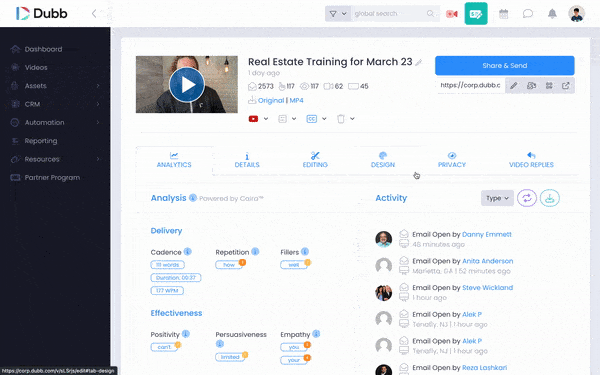
From there, you can automate the qualification and scoring that occurs after your audience engages with your content. Rather than manually going into your content management system and indicating whether a particular lead completed one of your videos or blog posts, you can rely on software to do the work for you. Specifically, you can build an automated workflow (which is somewhat similar to AI) and be confident that the software has your back.
A Quick Case Study
Let me put this in context. Let’s say that you created a video highlighting one of your properties. You used software that put that video on a video landing page and included a button below your video. That button can say “Learn More” or something like that.
If anyone clicks on that button, they are going to get enrolled in a lead scoring program. That will then create a task to follow up with that person. The software will also create a tag, which provides another indication that you will need to follow up with them.
This is one way that you can use automation for lead scoring. From there, you can go even further with your automation to further engage with the prospect. You can do everything from sending a follow-up email to that prospect or even sending a video via SMS.
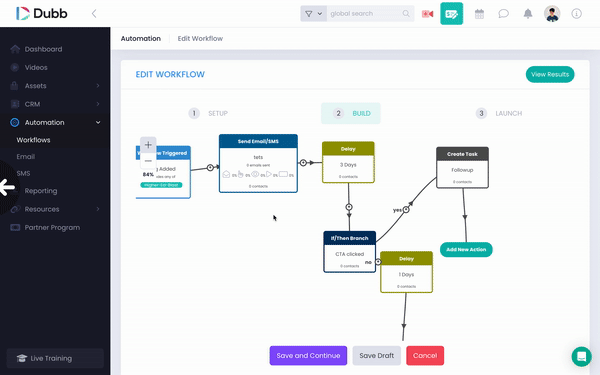
Basically, this is where the technology comes full circle. You are creating content, sharing it, and using analytics to create even more effective content. For each of these steps, you can rely on some form of automation or AI.
Creating a Workflow
Now, let’s take a little bit deeper dive into creating a nurturing workflow for all of your content. I like to think of it as the final frontier for sales and marketing. This is because you can constantly be engaging with and nurturing your audience throughout your day.
Using sales and marketing software, you can create simple or extremely complicated workflows for your audience members. For the simplest type of workflow, you will need some piece of content (like a video) and some type of response from your end (like an email). The workflow would go like this: a prospect watches a video and leaves their email address to learn more about you and your real estate firm. From there, the software would automatically send a pre-drafted email to that prospect. It could be everything from a “thanks for watching” email to an email containing a link, which lets the prospect schedule a call on your calendar. Even a simple workflow like this can help you save time and engage with your interested audience members.
Then, you can go one step further and create more complicated workflows. Those workflows, for instance, can contain conditional logic, delays, and more. The goal of these workflows isn’t to make your workflows complicated for the sake of being complicated. Rather, it is to really delve into who your prospects are, what they are interested in, and the problems that they may be facing. If you can do this, you will be in a much better position to create stronger relationships and find more clients.
In the end, the complexity is up to you. When starting out, you will probably want to create a simple workflow. As you get more experience, however, you may want to start creating more complicated workflows. Just keep in mind, however, that your goal is to build relationships and find new clients. It isn’t to create the most complex workflow possible.
Text Analysis
Now, I want to talk about using AI for text analysis.
One of the more exciting areas here is natural language processing (NLP). NLP is a subfield of AI that deals with the interaction between computers and human language. Using NLP techniques, AI can analyze text to understand its meaning, identify patterns and relationships, and extract useful information.
It goes one step deeper, however. NLP is often used with sentiment analysis to identify and extract the emotional tone or sentiment of a piece of text. Sentiment analysis is the process of automatically determining whether a piece of text expresses a positive, negative, or neutral sentiment.
I’m sure you can see how helpful this is. Using an AI tool that is equipped with NLP, you can see how your videos or text-based content are coming across. You can see if you are using more positive than negative words (or vice versa). You can monitor whether you are repeating words or using filler words. You can even easily determine whether you are using words that are persuasive or empathetic.
With this data in mind, you can then incorporate it into your new content. For instance, if you notice that you are using too many negative words in your content, you can replace them with more positive words. If you aren’t using enough persuasive words in your videos, you can find more persuasive words and put them in your script.
There are several AI tools out there that let you do this. One of these tools is called CAIRA. Released by Dubb, it can help you analyze your language and help you craft more effective sales videos. Beyond CAIRA and Dubb, you can find AI tools to help you refine your language and communicate more effectively.
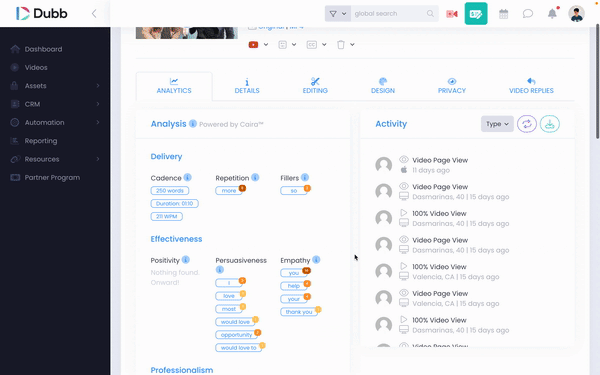
Whichever you choose, I’d encourage you to give this a try. AI tools that rely on NLP can help you become a more effective and concise communicator. It can help you adjust your tone to be more appropriate for the specific situation and improve the impact of your communication with your audience and prospects. These are significant benefits and benefits that you definitely don’t want to pass up.
Predictive Analytics and Property Valuation
Last (but certainly not least), I want to talk about using AI for historical and predictive analytics. This is an extensive topic that likely deserves its own article. That being said, AI is getting increasingly better at analyzing data on past sales and market trends and using that data to predict future demand for certain types of properties.
The benefit of this is pretty clear. This can help agents make more informed decisions about which properties to list and how to price them. AI can also be used to value the properties both in your portfolio and outside of your portfolio. Specifically, AI can be used to provide automated valuations of properties based on a variety of factors, such as location, size, and amenities. This can help agents like you provide more accurate and data-driven pricing recommendations to your clients.
I just wanted to bring this up as you are looking at different AI tools. While we have spent much of our time talking about how AI can help you generate amazing content, there are these other tools that can make your job a whole lot easier. The best way to see is to try them for yourself.
Using AI With an Open Mind
AI isn’t going away anytime soon. In fact, the odds are that it is going to become much more powerful.
Even though there are experts in current AI systems and experts contemplating the larger questions about AI, the simple fact is that none of us can be completely sure of where the technology is going. There are definitely good outcomes and bad outcomes here.
What does this mean for all of us? I think that we need to keep Socrates in mind. He once said that “I know that I know nothing.”
I would encourage all of us to think of this quote. We must remind ourselves that, yes, we may be experts in our particular fields. We may be experts in our local real estate market or even experts in sales or marketing. At the same time, it is helpful to approach AI with an open mind.
Who knows? You may find a new piece of information or strategy that can help you supercharge your real estate business.
So go ahead and try one of the free AI tools out there. Try implementing some of the tips and strategies that we discussed. In the end, I’m sure that you will find some significant value here.
About Dubb
Dubb is a video communications platform that can help you leverage video (and AI) to grow your real estate business. For instance, at Dubb, we offer our new Ira functionality that combines the functionality of ChatGPT and our native technology. You can also rely on CAIRA to analyze your language and create more effective videos and blog posts. To learn more about how Dubb can help you reach your goals, visit dubb.com.


